Daily Vocabulary Words: List of Daily Used Words in Leading Indian Newspapers
Hi there. Welcome to this special section @ Wordpandit. Our endeavour here is straightforward: highlighting daily vocabulary words that you would come across in leading newspapers in the country. We have included the following newspapers in our selection:
• The Times of India
• The Economic Times
• Hindustan Times
• Mint
• Indian Express
We are putting in extensive work to develop your vocabulary. All you have to do is be regular with this section and check out this post daily. This is your repository of commonly used words; essentially, we are posting a list of daily used words. Hence, this has significant practical application as it teaches you words that are commonly used in leading publications mentioned above.
Visit the website daily to learn words from leading Indian newspapers.
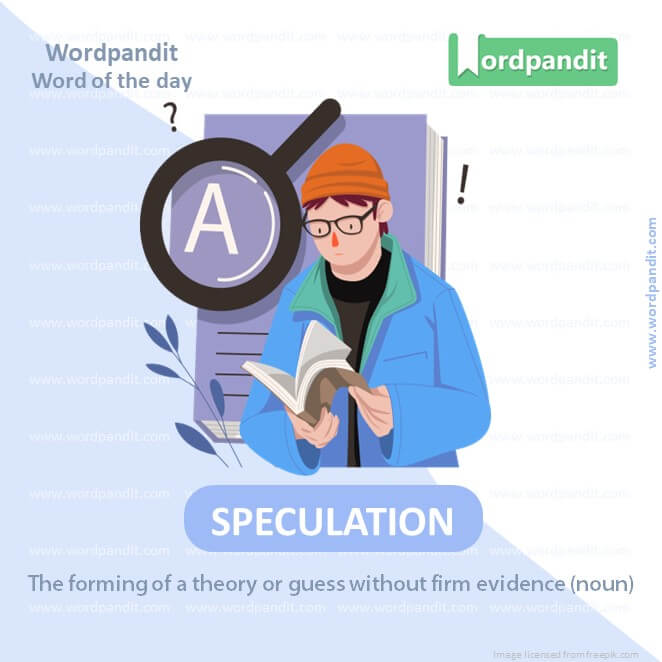
WORD-1: SPECULATION
CONTEXT: This has led to speculation that the coming special session of Parliament has been summoned to make the legal and constitutional amendments necessary for the purpose. The slogan ‘One nation, one election’ is being tom-tommed.
SOURCE: Times of India
EXPLANATORY PARAGRAPH: Imagine guessing what’s inside a wrapped gift. You don’t really know, but you’re making a guess based on what you think. “SPECULATION” is like making a guess or prediction about something without having all the details.
MEANING: The forming of a theory or guess without firm evidence. (noun)
PRONUNCIATION: spek-yuh-LAY-shun
SYNONYMS: Guesswork, conjecture, theory, hypothesis, surmise, assumption
USAGE EXAMPLES:
1. There’s a lot of SPECULATION about who will win the game.
2. The mayor’s sudden resignation led to much SPECULATION.
3. Her absence from the event was the subject of SPECULATION.
4. Financial experts are SPECULATION on the future of the stock market.
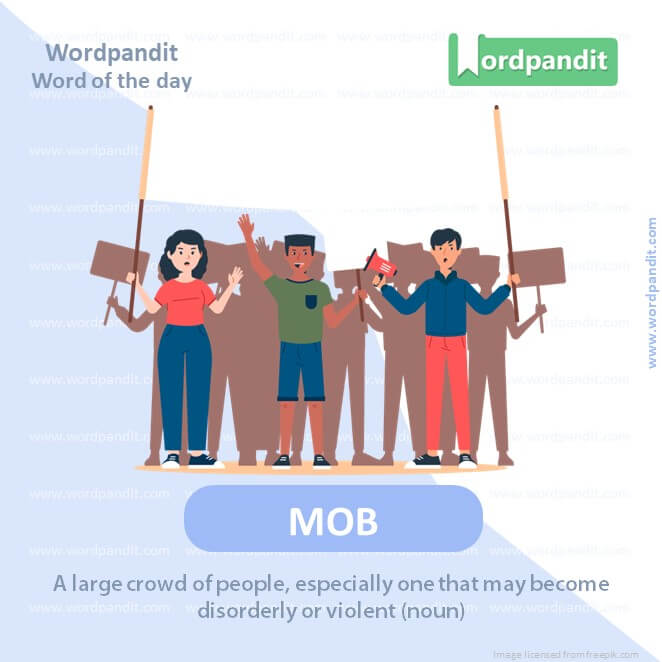
WORD-2: MOB
CONTEXT: How can an industrial worker name job security as the one thing and not name mob violence in his volatile neighborhood? How can a young couple name their parents’ approval as the one thing and not name fear of assault by the moral brigade?
SOURCE: Indian Express
EXPLANATORY PARAGRAPH: Imagine a big group of people, all moving together, maybe shouting or being loud. That’s called a “MOB.” Sometimes, it can be because they’re angry or excited about something.
MEANING: A large crowd of people, especially one that may become disorderly or violent. (noun)
PRONUNCIATION: MAAHB
SYNONYMS: Crowd, mass, group, throng, horde, gang
USAGE EXAMPLES:
1. The MOB gathered in front of the city hall.
2. The players were surrounded by an excited MOB of fans.
3. A MOB broke out in protest against the new law.
4. The store sale attracted a MOB of shoppers.
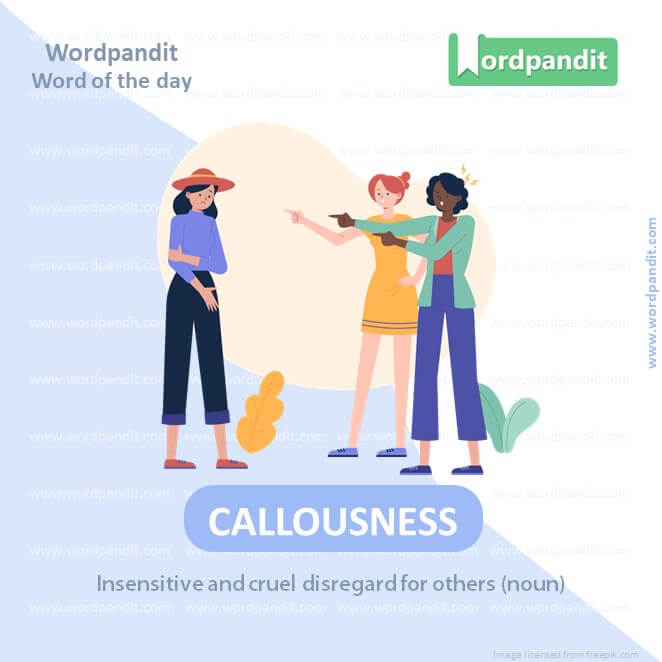
WORD-3: CALLOUSNESS
CONTEXT: My response to such callousness would be ‘if what existed hitherto will continue to exist and prevail, why did three generations struggle for freedom and for self-government?’
SOURCE: Indian Express
EXPLANATORY PARAGRAPH: Imagine someone stepping on a toy and breaking it, and then not even saying sorry to the kid who owned it. That not-caring and unfeeling behavior is “CALLOUSNESS.”
MEANING: Insensitive and cruel disregard for others. (noun)
PRONUNCIATION: KAL-us-ness
SYNONYMS: Insensitivity, heartlessness, unfeelingness, indifference, coldness
USAGE EXAMPLES:
1. The CALLOUSNESS of his remarks upset many people.
2. People were shocked by the CALLOUSNESS of the crime.
3. She displayed a CALLOUSNESS towards her friend’s problems.
4. The story highlights the CALLOUSNESS of the system.
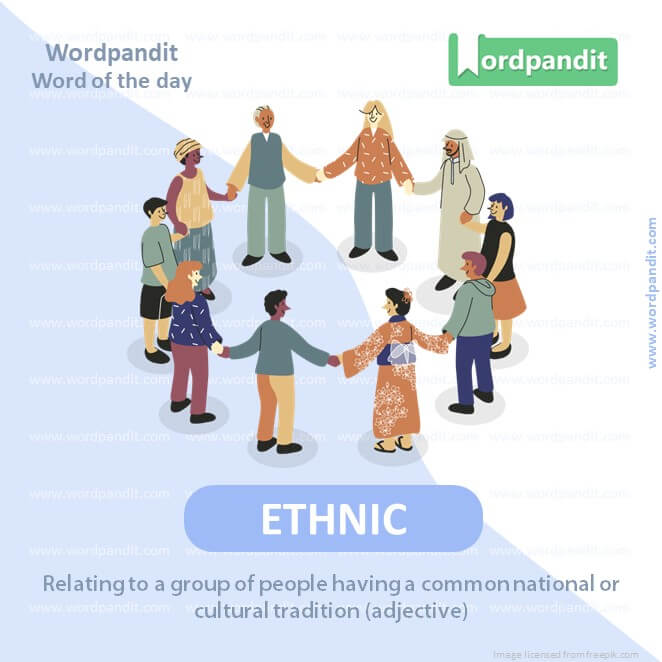
WORD-4: ETHNIC
CONTEXT: These goals challenge every society from the mono-ethnic (like Japan) to the most plural (like the US and India).
SOURCE: Indian Express
EXPLANATORY PARAGRAPH: Everyone comes from different parts of the world, with different customs, languages, or clothes. “ETHNIC” is a word we use to talk about these different backgrounds and cultures.
MEANING: Relating to a group of people having a common national or cultural tradition. (adjective)
PRONUNCIATION: ETH-nik
SYNONYMS: Racial, cultural, tribal, traditional, indigenous, national
USAGE EXAMPLES:
1. The city is known for its ETHNIC diversity.
2. They attended an ETHNIC festival over the weekend.
3. The country is made up of several ETHNIC groups.
4. The museum showcases ETHNIC art from around the world.
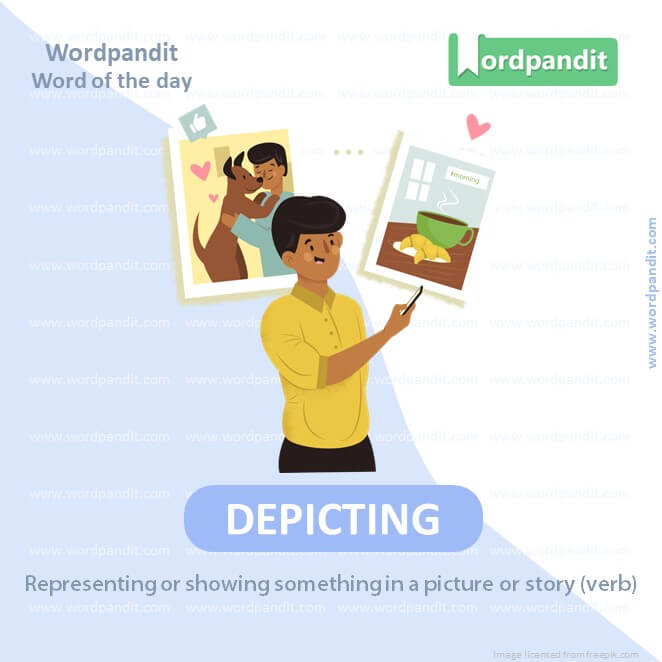
WORD-5: DEPICTING
CONTEXT: UPI services for foreign delegates, a VR cycle depicting India’s digital journey and a showcasing of India’s digital public infrastructure (DPI) like Aadhaar, direct-benefit-transfers and DigiLocker formed a key part of India’s diplomacy at the Bharat Mandapam in Delhi.
SOURCE: Times of India
EXPLANATORY PARAGRAPH: Imagine drawing a picture of your pet or family. You’re showing what they look like through your drawing. “DEPICTING” is like showing or representing something through art, words, or images.
MEANING: Representing or showing something in a picture or story. (verb)
PRONUNCIATION: deh-PIK-ting
SYNONYMS: Represent, portray, illustrate, show, paint, describe
USAGE EXAMPLES:
1. The painting is DEPICTING a beautiful sunset.
2. The film is DEPICTING the life of the famous scientist.
3. The book is DEPICTING the hardships of the war.
4. The sculpture is DEPICTING a warrior from ancient times.
WORD-6: THRUST
CONTEXT: The push to create an India-led multilateral institution — the One Future Alliance and the Global Digital Public Infrastructure Repository— to take the Indian experience global reflects the importance of this thrust.
SOURCE: Times of India
EXPLANATORY PARAGRAPH: Imagine pushing something really quickly and forcefully, like when you’re using a toy sword. That forceful push is called a “THRUST.”
MEANING: A quick and forceful push. (noun)
PRONUNCIATION: THRUHST
SYNONYMS: Push, shove, lunge, jolt, prod, poke
USAGE EXAMPLES:
1. He made a sudden THRUST with his sword.
2. The THRUST of the rocket was powerful.
3. The main THRUST of her argument was that change was needed.
4. With a quick THRUST, he opened the door.
WORD-7: INTEROPERABILITY
CONTEXT: Built on the principles of open access and interoperability, DPI has not only created a new digital highway for connecting India in unprecedented ways, it has also provided New Delhi with new opportunities for leadership in the Global South.
SOURCE: Times of India
EXPLANATORY PARAGRAPH: Imagine two different toy sets, and you can use pieces from one set with the other set. That’s because they can work together. “INTEROPERABILITY” means that different systems or products can work together without any problem.
MEANING: The ability of different systems, devices, or applications to work together and exchange information. (noun)
PRONUNCIATION: in-tur-op-er-uh-BIL-ih-tee
SYNONYMS: Compatibility, cooperation, collaboration, conjunction, coordination
USAGE EXAMPLES:
1. The software has good INTEROPERABILITY with older versions.
2. INTEROPERABILITY is a key feature for new tech products.
3. The two companies are working on INTEROPERABILITY of their devices.
4. Lack of INTEROPERABILITY is a challenge in the healthcare system.
WORD-8: DAZZLING
CONTEXT: Let me begin then by giving the Prime Minister full credit for understanding so well that this was a chance for him to project India as a country that has transitioned from being a shabby little socialist dump into a dazzling new superstar.
SOURCE: Indian Express
EXPLANATORY PARAGRAPH: Imagine looking at something so shiny and bright that it almost makes your eyes hurt or makes you say “wow!”. That very bright and amazing thing is “DAZZLING.”
MEANING: Extremely bright, impressive, or skillful. (adjective)
PRONUNCIATION: DAZ-uh-ling
SYNONYMS: Brilliant, shining, glittering, sparkling, radiant, amazing
USAGE EXAMPLES:
1. The fireworks gave a DAZZLING display.
2. She wore a DAZZLING diamond necklace.
3. His performance was simply DAZZLING.
4. The city lights were DAZZLING at night.
WORD-9: SYCOPHANT
CONTEXT: I saw it as the work of some zealous sycophant and posted it in the hope that someone would take it down.
SOURCE: Indian Express
EXPLANATORY PARAGRAPH: Imagine someone who always says nice things to a teacher, just to get a candy or a special treat, even if they don’t mean it. A “SYCOPHANT” is someone who flatters or praises someone important to get something from them.
MEANING: A person who acts obsequiously towards someone important in order to gain advantage. (noun)
PRONUNCIATION: SICK-oh-fant
SYNONYMS: Flatterer, bootlicker, brown-noser, toady, groveler, flunky
USAGE EXAMPLES:
1. She was tired of the SYCOPHANTS who surrounded her.
2. He was known as a SYCOPHANT, always praising the boss.
3. Politicians often have SYCOPHANTS around them.
4. Don’t be a SYCOPHANT; be genuine in your compliments.
WORD-10: GLEAMING
CONTEXT: The G20 summit prep team is clearly following this manual. What can be cleaned has been scrubbed to a gleaming finish, and what can’t, is hidden behind a heap of posters, screens, and flowers.
SOURCE: Times of India
EXPLANATORY PARAGRAPH: Imagine the sun shining on a clean car, and the car looks so shiny and sparkly. That shiny look on the car is “GLEAMING.”
MEANING: Shining brightly, especially with reflected light. (adjective)
PRONUNCIATION: GLEEM-ing
SYNONYMS: Shiny, sparkling, glistening, glittering, bright, polished
USAGE EXAMPLES:
1. His new bike was GLEAMING in the sunlight.
2. The castle’s GLEAMING towers could be seen from miles away.
3. After cleaning, the kitchen was GLEAMING.
4. She admired her GLEAMING new ring.
Vocabulary Exercises
In the domain of language learning, ‘vocabulary exercises’ are fundamental. They foster in-depth understanding, usage, and retention of vocabulary. By adopting a systematic approach, learning from ‘vocabulary exercises’ can become interactive, effective, and fun.
Understanding ‘vocabulary exercises’ begins with formulating an individualized learning plan. Based on varied language goals, different ‘vocabulary exercises’ might include flashcards, word mapping, or online quizzes. Formulating your unique approach can ensure consistent and targeted vocabulary growth.
One way to approach ‘vocabulary exercises’ is through exploration of themed vocabulary. Pick a theme of interest (such as technology, sports, or food) and exercise on words related to that theme. This method keeps the learning process engaging, relevant, and easier to remember due to the common thread connecting the words.
Another powerful means of ‘vocabulary exercises’ is frequent usage of words in sentences. Constructing sentences utilizes vocabulary in a contextual manner and serves as a practical demonstration of word usage, greatly reinforcing memory retention and understanding.
In the contemporary learning landscape, digital platforms provide innovative ‘vocabulary exercises’. These platforms offer games, quizzes, flashcards, and even community challenges which make learning vocabulary interactive and more dynamic.
It is essential to remember that consistency is crucial while undertaking ‘vocabulary exercises’. Regular practice ensures higher retention rates and better application of the learned vocabulary in real-world scenarios.
In conclusion, ‘vocabulary exercises’ are an integral part of language learning, contributing immensely to vocabulary expansion. Whether it’s through thematic vocabularies, sentence formation, or digital tools, when consistently practiced, ‘vocabulary exercises’ can provide a stimulating and multifaceted approach to enriching your linguistic prowess.













